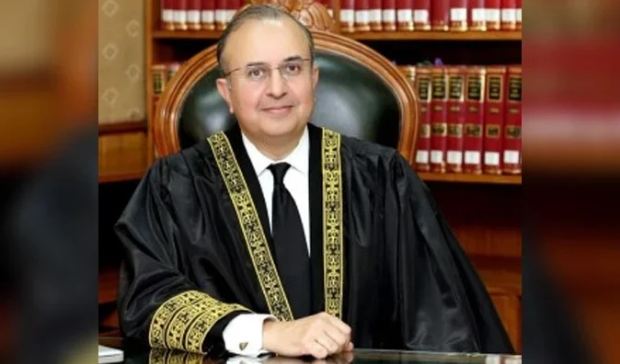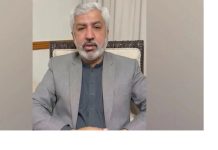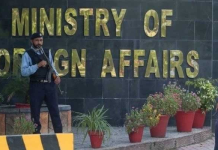ISLAMABAD: Justice Mansoor Ali Shah of the Supreme Court observed Friday that it seemed as if attempts are being made to find flaws in the amendments made to the National Accountability Ordinance (NAO) 1999.
“This is not a case of the violation of fundamental rights,” he remarked during the hearing of a petition filed by Pakistan Tehreek-e-Insaf (PTI) chief Imran Khan challenging the NAB amendments made by the then Pakistan Democratic Movement (PDM)-led government in 2022.
A three-member bench, headed by Chief Justice of Pakistan (CJP) Umar Ata Bandial, and comprising Justice Mansoor and Justice Ijazul Ahsan, heard the petition.
During the hearing, PTI’s legal counsel Khawaja Haris contended that the fundamental rights of people are affected by obstruction in the accountability process of public office holders in NAB cases.
However, Justice Monsoor remarked that the NAB amendments were not a matter of violation of fundamental human rights.
He said: “If we accept for a minute that the members of parliament made amendments to benefit themselves, should we declare the NAB amendments null and void? On what grounds should we do that?”
Haris responded that the court could declare the NAB amendments void under Article 9.
Justice Mansoor rejected this and remarked: “Let the Judiciary and parliament operate in their own way, otherwise the democratic system will not work.”
He further observed that it seemed that attempts were being made to find flaws in the NAB amendments, but nothing could be found so far.
He said that the elections were around the corner and it should be left for the people to decide.
“The biggest violation is how a person left parliament of his own free will,” Justice Mansoor remarked, adding that a parliamentarian is a trustee of the people.
On PTI chief’s response that the move was a political decision, Justice Mansoor demanded: “Parliament’s forum was there, how did someone leave the representation of their constituency? What is the good intention of the petitioner?”
It must be noted that Justice Mansoor has suggested in the hearing on August 18 that CJP Bandial form a full court to hear Khan’s petition.
“I think that the NAB amendments case should be heard by the full court; the case will have its own impact,” Justice Mansoor remarked during the 48th hearing on the petition.
CJP Bandial disagrees with Justice Mansoor
CJP Bandial, however, disagreed with Mansoor and remarked that the NAB laws were indeed being misused.
“Pardons are being given by NAB indiscriminately,” he said, adding that authority had been given in the hands of evil people.
“It is the responsibility of the state to establish a just and fair society.
“The state has to ensure that criminals do not roam free, he said.”
He added that people are leaving the country after being denied economic opportunities.
“Justice Mansoor is raising the question of the direct relation of fundamental rights. We understand that many fundamental rights have been affected by the NAB amendments,” he remarked.
“NAB amendments did not directly violate fundamental rights, but there is definitely an aspect directly affecting rights in the NAB amendments,” he said, adding that they must cut down and see the relationship between fundamental rights and the amendments.
He remarked that if the institution of the auditor general is strengthened, he can look into these matters himself.
“The Auditor General of Pakistan is an important constitutional institution. A strong auditor general’s office can also look into the accounts of provinces, CJP Bandial remarked.
‘Serious matter’
Earlier, the PTI chairman’s lawyer said that evidence is taken from foreign countries through mutual legal cooperation, on which the CJP inquired about the legal status of the evidence obtained from foreign countries.
Khawaja Haris said that evidence obtained from abroad is taken through the Foreign Office, and there is a whole process of verification.
“How much is the scope of legal assistance from abroad in the law of Pakistan?” the CJP then asked, to which Haris replied that legal assistance received from abroad was not given much importance.
The chief justice then said that the return of NAB references before May 2023 was a “serious matter”.
“We have a list based on the details related to the return of NAB references.”
The CJP then pointed out that recently an accused agreed to plea bargain in a NAB case from Sindh after the accountability bureau increased the plea bargain amount.
“This was a ridiculous act,” the CJP remarked, adding that justice must be maintained.
Status of evidence from abroad
At the outset of the hearing today, the CJP pointed out that the status of evidence obtained under mutual legal cooperation had been abolished in the amendments.
“Now NAB will have to take services there itself, which will be expensive,” he said, adding it was said yesterday that apart from mutual legal cooperation, there have been reports of properties from abroad.
“However, evidence obtained from this source is not acceptable under law,” he said.
He said the records obtained by the Federal Bureau of Revenue (FBR) from abroad were not admissible evidence in the court.
“Are the rights of the complainant listed in the Constitution of Pakistan?” the CJP asked.
The government’s legal counsel Makhdoom Ali Khan said that the constitution only mentions the rights of the accused and fair trial.
“The constitution of Pakistan does not talk about the rights of the complainant.”
He added that the courts should look at the evidence legally. “Swiss courts did not accept the evidence of their country against Asif Zardari.”
At this, Justice Ahsan said that the Swiss cases were closed due to a shortage of time and not a lack of evidence.
‘Conviction less than 50% in NAB cases’
Furthermore, during the hearing, Makhdoom pointed out that billions of rupees were spent on NAB investigations, with little results as the conviction rate in NAB cases is less than 50%.
The CJP responded: “In our criminal justice system, even the conviction rate is less than 70%, many of these cases also eventually settle.”
Expressing concern over the fact that 30 to 40% of people in murder cases are not brought to justice, the CJP said: “The main function of the state is to provide justice to the people.”
The lawyer of the federal government said that many victims refuse to identify the accused in court, the victims are not sure whether they will be safe after identifying the accused or not.
The hearing was adjourned to September 5, Tuesday.
















